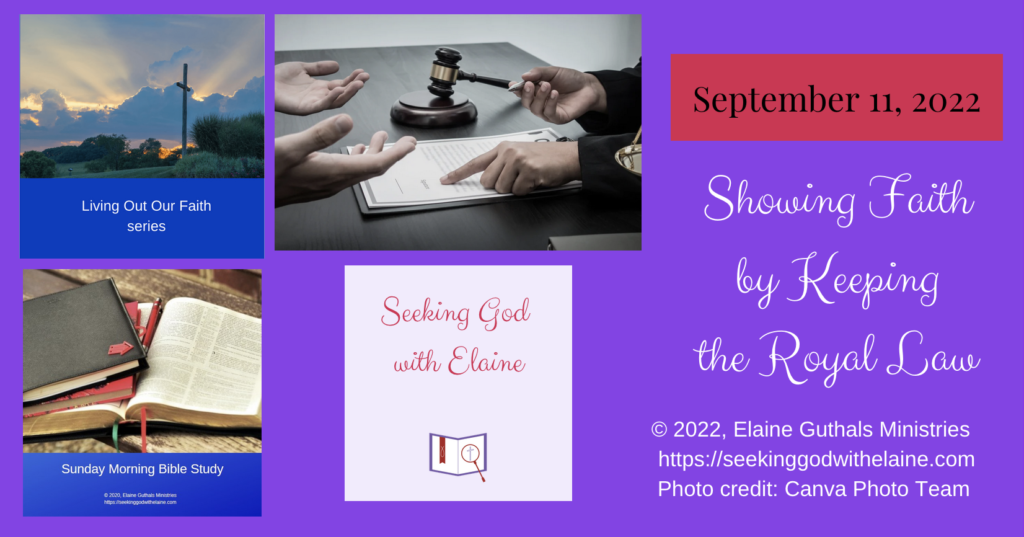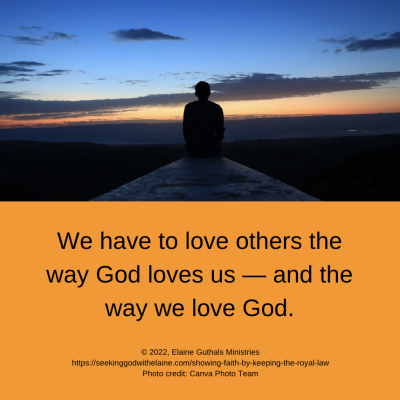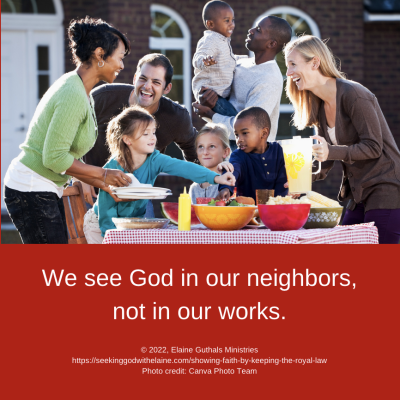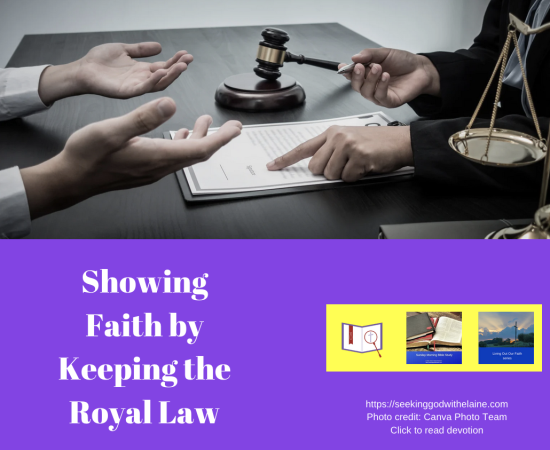James told his readers that they should not show favoritism because that broke the second greatest commandment. This daily devotion looks at how following the royal law helps us to love one another.
Nuggets
- Showing partiality breaks the commandment to love our neighbors.
- As the laws and commandments are interconnected, we must keep all of them.
- We should show mercy to others because only obedience to the law sets us free.
Devotions in Living Out Our Faith series

James told his readers that we are not to judge others based on appearance. Instead, we are to love them.
Let's Put It into Context
Here is a running list of nuggets for the series.
The Law of Love
“If you really fulfill the royal law according to the Scripture, ‘You shall love your neighbor as yourself,” you are doing well. But if you show partiality, you are committing sin and are convicted by the law as transgressors’” (Jas. 2: 8-9 ESV)
Showing partiality breaks the commandment to love our neighbors.
The second greatest commandment is Mark 12: 31. “The second is this: ‘You shall love your neighbor as yourself.’ …” (Mk. 12: 31 ESV).
I think it is interesting that James said, “If you really fulfill the royal law according to the Scripture …” (Jas. 2: 8 ESV emphasis added). Our love for others can’t be a fake love. We can’t love others to fit the worldview definition of love.
We have to love others the way God loves us — and the way we love God.

How are we to love God? “And you shall love the Lord your God with all your heart and with all your soul and with all your mind and with all your strength” (Mk. 12: 30 ESV).
Harris talked about this. He wrote, “It is because in God man finds the ideals which are the prototypes of all that is noble in himself, and which therefore he must love if he would be true to his own better nature and higher destiny.”
Resource
God gives us the example of how to love.
We could also tie in the Golden Rule here. “Therefore, whatever you want others to do for you, do also the same for them, for this is the Law and the Prophets” (Mt. 7: 12 CSB).
Verse Commentary
Love encompasses all these aspects.
We can struggle with loving others. For that matter, we can struggle with loving God.
I don’t think it is talking quantity right here. I think it is talking quality.
The kicker is we really aren’t going to have one without the other. We won’t have quality love with spending a quantity of time with them.
Harris went on to say why this is important. He wrote, “And the obligation of man to love his neighbour as himself lies in the fact that it is in his neighbour that man gets his clearest revelation of God — more clear than any revelation in words or works. It is in the soul of man when looked at with the eyes of neighbourliness that man gets his best vision of the majesty and beauty of God.”
We see God in our neighbors, not in our works.
Resource

Okay. Let’s percolate for a second.
We’re getting a little ahead of ourselves in this study, but as good disciples we know what James was going to say. “So also faith by itself, if it does not have works, is dead” (Jas. 2: 17 ESV).
James has already said that the faith and patience that we get through trials brings us to perfection/maturity. We get there through our works — working out our salvation.
Now, this is saying that we see God in people, not in the things we do. We don’t see Him either in doing our acts of kindness or working out our salvation.
We see God in the relationship.
The relationship is what God really wants. We can’t earn salvation by doing things.
In our Redo for Godliness theme, we said we can only gain perfection through being. Sanctification is achieved through being, doing, and suffering.
We are sanctified through being in a relationship with God and doing what is needed to work out our salvation, which occurs through trials.
James called it the royal law. “If you really fulfill the royal law according to the Scripture …” (Jas. 2: 8 ESV).
Turnball reminded us that the royal law is the law of love and righteousness. The law of love and righteousness does not have room for condemnation or prejudice.
Resource
We tend to limit things. These limits are put on by what we see and understand.
It isn’t about us. It is about God and His purpose to love everyone.
Keeping All the Law
“For whoever keeps the whole law but fails in one point has become guilty of all of it. For he who said, ‘Do not commit adultery,’ also said, ‘Do not murder.’ If you do not commit adultery but do murder, you have become a transgressor of the law” (Jas. 2: 10-11 ESV)
As the laws and commandments are interconnected, we must keep all of them.
It can be hard to understand how it can be an all or nothing deal — especially when we know we will continue to sin as long as we are in these earthly bodies.
Rogers helped explain what that could mean. He sees the “one point” of sin that is committed as something that is voluntary. We consciously choose to sin when we know better.
I can see that. We have to consciously choose to follow God. Conversely, that means we have to consciously choose to sin.
To me, that explains the all or nothing aspect of keeping the law. God calls us to total submission to His law.
If we choose to sin against one law, our total submission is out the door. It could be said that we are picking and choosing what how we are following God.
God doesn’t accept that.
That also raises the point that we can’t be really good at not committing murder and think that makes up for the adultery we commit. Rogers explained it. He wrote, “For it is not our performing any particular action, but our performing it in obedience to the Divine law, that renders it acceptable to God.”
Resource
Aren’t we so like that? We want the easy way. We want the compromise.
We want it whatever way we want it at the moment.
But God says the blessing is in the obedience.
Breaking God’s laws and commandments show that we are more focused on ourselves than Him. It tells Him that we are more in tune with the worldview than Him.
I know. I know. We have free will. Free will is the ability within us to make decisions, which determine actions that produce character.
Unfortunately, that means we can make the wrong choice and break God’s law.
Fortunately when we do that, we can ask forgiveness. Forgiveness is, when we ask, the act of God pardoning us because we have shown repentance for breaking His laws and commandments, which allows us to become holy as He is.
- Repentance is acknowledging our separation from God and expressing sorrow for breaking God’s laws and commandments by making the commitment to changing ourselves through obedience so that we no longer do the wrong things.
- Holy means to be set apart — because of our devotion to God — to become perfect, and morally pure while possessing all virtues.
- Perfection means we reach a state of maturity because the combination of the spiritual graces form, when all are present, spiritual wholeness or completeness — holy, sanctified, and righteous
- Spiritual graces are worldly morals that have been submitted to God to further His kingdom instead of enhancing this world.
- Sanctified means to be set free from sin.
- Righteous means we are free from sin because we are following God’s moral laws.
- Pure means not being sinful or having the stain of sin.
- Virtues are standards of moral excellence.
- Perfection means we reach a state of maturity because the combination of the spiritual graces form, when all are present, spiritual wholeness or completeness — holy, sanctified, and righteous
- Holy means to be set apart — because of our devotion to God — to become perfect, and morally pure while possessing all virtues.
Let’s look at it another way. What did Jesus say right after the two greatest commandments? “All the Law and the Prophets hang on these two commandments” (Mt. 22: 40 NIV).
That tells us that all the laws are interconnected. So, you break one, you break them all. Run over a nail, and the air from the entire tire is going to seep out.
What is this really saying? If we do not ask forgiveness when we break one of the laws, we will be guilty of breaking them all.
Professing belief in God to secure salvation does not give us license to continue sinning. Prior professions do not necessarily show current submission.
Mercy to Those Judged under the Law
“So speak and so act as those who are to be judged under the law of liberty. For judgment is without mercy to one who has shown no mercy. Mercy triumphs over judgment” (Jas. 2: 13 ESV)
We should show mercy to others because only obedience to the law sets us free.
James had talked about the gospel being the law of liberty in Chapter 1. “But the one who looks into the perfect law, the law of liberty, and perseveres, being no hearer who forgets but a doer who acts, he will be blessed in his doing” (Jas. 1: 25 ESV).
Even though he had just called it the royal law, James went back to calling it the law of liberty. It is all of this.
- It is the law of Sovereign God.
- It is the law of love and righteousness.
- It is the law that changes our character to that of God’s as we work out our salvation.
Only our adequate obedience to the law will set us free. Conversion happens only when we agree to constrain ourselves to following God’s laws.
James admonished his readers to act like they would be judged under these laws — because everyone is going to be judged under it. Revelation 20: 12 says, “And I saw the dead, great and small, standing before the throne, and books were opened. Then another book was opened, which is the book of life. And the dead were judged by what was written in the books, according to what they had done” (ESV).
We will be judged with mercy when we have chosen salvation. God’s mercy is an act of sovereign will that produces an unexpected and undeserved response from God as He responds in love to our needs.
God loves us so much that He will forgive our sins when we ask and choose to follow His laws and commandments.

Making the Connections
Cooper summed it up nicely. He wrote, “The great obstacle to the acceptance of the gospel message is the want of a deep and permanent conviction of the enormity of sin and of our actual transgression before God.”
Resource
The main reason many can’t submit to the gospel is they don’t have believe that sin is sin and that God has the right to call it so, let alone hold us to obedience to it.
Obedience is what it is all about. Not understanding.
Really, it isn’t even about our submission. That would make it about us.
It is totally about Him. He is Sovereign God.
How Do We Apply This?
- Ask forgiveness when we break God’s laws and commandments.
- Understand that breaking what we could consider a small law is, in God’s eyes, the same as if we had broken what we consider a major law.
- Accept that we cannot earn salvation because of our obedience or works.
- Humble ourselves before God.
- Be totally committed to God’s laws to not show insincerity.
Resource
Father God. We want to follow Your laws. We want to love others as ourselves. Help us to see them as You see them. Amen.
What do you think?
Leave me a comment below (about this or anything else) or head over to my Facebook group for some interactive discussion.
If you don’t understand something and would like further clarification, please contact me.
If you have not signed up for the email daily or weekly providing the link to the devotions and the newsletter, do so below.
If God has used this devotion to speak with you, consider sharing it on social media.